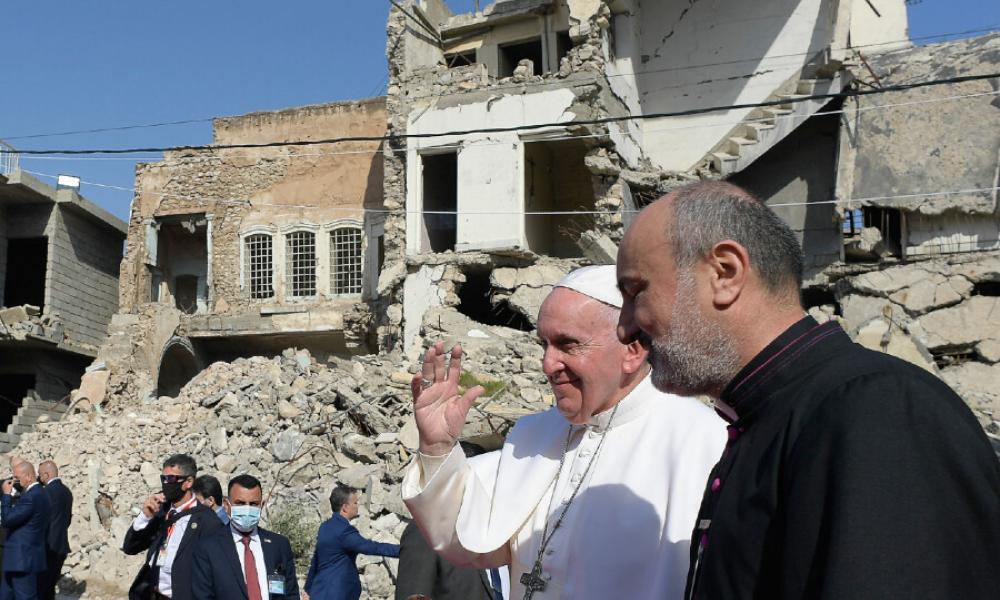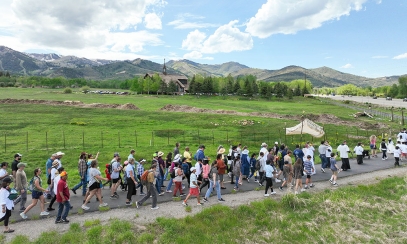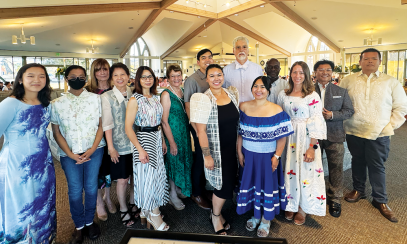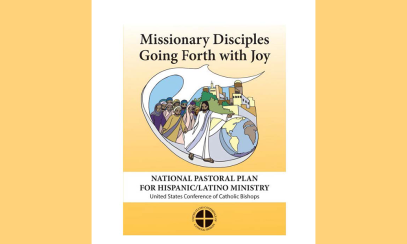
Pope Francis Visits Iraq to Promote Peace, Build Fraternity
Pope Francis Fulfills St. John Paul’s Dream with Visit to Iraq
Pope Francis’ visit to Iraq March 5-8 was the realization of a dream first envisioned by St. John Paul II in 1999. Invited by the Iraqi government and Christian churches, Pope Francis is the first successor of St. Peter to visit the primarily Islamic country. The Apostolic visit to support Iraqi Christians who have suffered persecution, to encourage peace and reconciliation and to build fraternity among people of faith has long been a priority for Pope Francis.
Pope Francis met privately with Grand Ayatollah Sayyid Ali Al-Husayni Al-Sistani at his residence in Najaf on March 6. The pope wanted to meet him after Al-Sistani had raised his voice in defense of the weakest and most persecuted, affirming the sacredness of human life. Pope Francis described the meeting as “unforgettable” in his comments at his General Audience on March 10.
The Pope participated in interreligious services on Mar. 6 at Nassiriya in the Plain of Ur, where Abraham, the father of Judaism, Christianity and Islam, received the call to trust God.
Pope Francis celebrated Masses at the Catholic Chaldean Cathedral of St. Joseph on March 6 in Baghdad, and at the Franso Hariri Stadium in Erbil on Mar. 7 with a socially-distanced crowd of 10,000.
In the city of Mosul on March 7, he led the Prayer of Suffrage for the Victims of the War at Hosh al-Bieaa, the square that is home to the Syriac Catholic, Syriac Orthodox, Armenian Orthodox and Chaldean Catholic Churches damaged or destroyed by the Islamic State.
At the Syriac Catholic Church of the Immaculate Conception in Qaraqosh, under reconstruction after destruction by the Islamic State, Pope Francis prayed the Angelus in a church packed with a loud and joyous congregation.
In his General Audience summarizing the experience on March 10, Pope Francis said, “Let us pray that these days will contribute to the continuing journey towards fraternity and peace in Iraq, the Middle East, and the whole world.”
How Many Christians Live in Iraq?
More than 1.4 million Christians of Latin, Maronite, Greek Catholic, Coptic, Armenian and Assyrian Churches lived in Iraq prior to the 2003 invasion to depose Saddam Hussein. Today, less than 400,000 Christians remain, rebuilding churches and communities destroyed during the war and the desecration that followed during the ISIS (Islamic State of Iraq and Syria) occupation from 2014-16.
Rebuilding Churches, Communities and Hope
Qaraqosh is an Assyrian city in Northern Iraq near the ancient city of Nineveh with a majority Christian population, the largest Christian community in Iraq. In 2014, the Islamic State invaded and destroyed homes, libraries and churches. Tens of thousands of Christians fled to nearby Kurdistan for safety. After liberation from the occupation in October 2016, residents have been rebuilding the community and people have been returning to their homes.
During the invasion, the Syriac Catholic Church of the Immaculate Conception was vandalized and suffered damage to walls and pillars. Pews, furniture, hymnals and sacred books were burned inside and statues were destroyed. Local parishioners have been cleaning the smoke-charred walls and with aid from Christian organizations and charities, have been repairing the structural damage. A new, 13 ft. statue of the Blessed Virgin Mary greeted Pope Francis from atop the church as he arrived by helicopter on March 7.
Pope Francis blessed a restored statue of Mary that had been desecrated and said, “Her image here has met with mistreatment and disrespect, yet the face of the Mother of God continues to look upon us with love. For that is what mothers do: they console, they comfort and they give life. I would like to say a heartfelt thank-you to all the mothers and women of this country, women of courage who continue to give life, in spite of wrongs and hurts. May women be respected and protected! May they be shown respect and provided with opportunities!”
Iraqi Christians Prepared for Visit by Pope Francis with Prayer
Cardinal Louis Raphael Sako, Patriarch of the Chaldean Catholic Church, told reporters in December that Pope Francis will be well-received. “Everyone in Iraq, Christians and Muslims, esteem him [Pope Francis] for his simplicity and nearness. His words touch everyone’s hearts because they are those of a shepherd. He is a man who brings peace.”
In anticipation of Pope Francis’ visit to Iraq, Cardinal Sako composed a prayer that the Chaldean faithful began reciting at Sunday Masses on Jan. 17:
Lord our God, grant Pope Francis health and safety to carry out successfully this eagerly awaited visit. Bless his effort to promote dialogue, enhance fraternal reconciliation, build confidence, consolidate peace values and human dignity, especially for us Iraqis who have been through painful “events” that affected our lives.
Lord and Creator, enlighten our hearts with Your light, to recognize goodness and peace, and to realize them.
Mother Mary, we entrust Pope Francis’ visit to your maternal care so that the Lord may grant us the grace of living in full national communion, and to cooperate fraternally to build a better future for our country and our citizens. Amen.
Pope Francis Inspired by Mother’s Words on Forgiveness
In his visit to Qaraqosh, Pope Francis told listeners that he was moved deeply by the attitude of forgiveness expressed by Doha Sabah Abdallah, a mother whose son was killed in the first suicide bombing by the Islamic State. “She said that forgiveness is needed on the part of those who survived the terrorist attacks. Forgiveness; that is a key word. Forgiveness is necessary to remain in love, to remain Christian. The road to a full recovery may still be long, but I ask you, please, not to grow discouraged. What is needed is the ability to forgive, but also the courage not to give up.”
The pope referred to her story again, sharing her words with the press on the flight home from Iraq, “Our strength undoubtedly comes from our faith in the Resurrection, a source of hope. My faith tells me that my children are in the arms of Jesus Christ our Lord. And we, the survivors, try to forgive the aggressor, because our Master Jesus has forgiven his executioners. By imitating him in our sufferings, we testify that love is stronger than everything,” the Iraqi woman said. Pope Francis concluded, “I forgive. This is a word we have lost. We know how to insult big time. We know how to condemn in a big way … But to forgive, to forgive one’s enemies. This is the pure Gospel. This hit me in Qaraqosh.”
Beatification Process of Victims of Iraqi Bombing Underway
The Syriac Catholic Cathedral of Our Lady of Salvation, also known as Sayidat al-Nejat, where Pope Francis met with Iraqi Catholics in Baghdad is the site of a suicide attack by the Islamic State terrorists during Sunday Mass in 2010. More than 50 people were killed, including two priests, before Iraqi security forces stormed the church with the support of U.S. forces. The beatification process of the 48 Catholics who died inside the church advanced from the diocesan phase to the Vatican in October 2019.
Excerpts from the pope’s Homilies and Addresses during the Trip to Iraq
From the Address of His Holiness at the Interreligious Meeting at the Plain of Ur – March 6
“From this place, where faith was born, from the land of our father Abraham, let us affirm that God is merciful and that the greatest blasphemy is to profane his name by hating our brothers and sisters.”
“It was precisely through hospitality, a distinctive feature of these lands, that Abraham was visited by God and given the gift of a son, when it seemed that all hope was past (cf. Gen 18:1-10). Brothers and sisters of different religions, here we find ourselves at home, and from here, together, we wish to commit ourselves to fulfilling God’s dream that the human family may become hospitable and welcoming to all his children; that looking up to the same heaven, it will journey in peace on the same earth.”
After the meeting, the pope prayed the following prayer with representatives of Iraqi Christian churches, Jews and Muslims. It is a prayer for strength, reconciliation and peace.
Prayer of the Children of Abraham
Almighty God, our Creator, you love our human family and every work of your hands:
As children of Abraham, Jews, Christians and Muslims, together with other believers and all persons of good will, we thank you for having given us Abraham, a distinguished son of this noble and beloved country, to be our common father in faith.
We thank you for his example as a man of faith, who obeyed you completely, left behind his family, his tribe and his native land, and set out for a land that he knew not.
We thank you too, for the example of courage, resilience, strength of spirit, generosity and hospitality set for us by our common father in faith.
We thank you in a special way for his heroic faith, shown by his readiness even to sacrifice his son in obedience to your command. We know that this was an extreme test, yet one from which he emerged victorious, since he trusted unreservedly in you, who are merciful and always offer the possibility of beginning anew.
We thank you because, in blessing our father Abraham, you made him a blessing for all peoples.
We ask you, the God of our father Abraham and our God, to grant us a strong faith, a faith that abounds in good works, a faith that opens our hearts to you and to all our brothers and sisters; and a boundless hope capable of discerning in every situation your fidelity to your promises.
Make each of us a witness of your loving care for all, particularly refugees and the displaced, widows and orphans, the poor and the infirm.
Open our hearts to mutual forgiveness and in this way make us instruments of reconciliation, builders of a more just and fraternal society.
Welcome into your abode of peace and light all those who have died, particularly the victims of violence and war.
Assist the authorities in the effort to seek and find the victims of kidnapping and in a special way to protect women and children.
Help us to care for the earth, our common home, which in your goodness and generosity you have given to all of us.
Guide our hands in the work of rebuilding this country, and grant us the strength needed to help those forced to leave behind their homes and lands, enabling them to return in security and dignity, and to embark upon a new, serene and prosperous life. Amen.
Prayer of Suffrage for the Victims of War
Hosh al-Bieaa (Church square), Mosul – March 7
Today, however, we reaffirm our conviction that fraternity is more durable than fratricide, that hope is more powerful than hatred, that peace more powerful than war. This conviction speaks with greater eloquence than the passing voices of hatred and violence, and it can never be silenced by the blood spilled by those who pervert the name of God to pursue paths of destruction.
Before we pray in this city of Mosul for all the victims of war, in Iraq and in the entire Middle East, I would like to share with you these thoughts:
If God is the God of life – for so he is – then it is wrong for us to kill our brothers and sisters in his Name.
If God is the God of peace – for so he is – then it is wrong for us to wage war in his Name.
If God is the God of love – for so he is – then it is wrong for us to hate our brothers and sisters.
Let us now join in praying for all the victims of war. May Almighty God grant them eternal life and unending peace, and welcome them into his fatherly embrace. Let us pray too for ourselves. May all of us – whatever our religious tradition – live in harmony and peace, conscious that in the eyes of God, we are all brothers and sisters.
Excerpts of Homily by Pope Francis in Erbil for the Third Sunday of Lent – March 7
“Here in Iraq, how many of your brothers and sisters, friends and fellow citizens bear the wounds of war and violence, wounds both visible and invisible! The temptation is to react to these and other painful experiences with human power, human wisdom. Instead, Jesus shows us the way of God, the path that he took, the path on which he calls us to follow him.
“The Church in Iraq, by God’s grace, is already doing much to proclaim this wonderful wisdom of the cross by spreading Christ’s mercy and forgiveness, particularly towards those in greatest need. Even amid great poverty and difficulty, many of you have generously offered concrete help and solidarity to the poor and suffering. That is one of the reasons that led me to come as a pilgrim in your midst, to thank you and to confirm you in your faith and witness. Today, I can see at first hand that the Church in Iraq is alive, that Christ is alive and at work in this, his holy and faithful people.”
Greeting of His Holiness Pope Francis at the conclusion of Mass in Erbil – March 7
“In my time among you, I have heard voices of sorrow and loss, but also voices of hope and consolation. This was due in large part to that tireless charitable outreach made possible by the religious institutions of every confession, your local Churches and the various charitable organizations assisting the people of this country in the work of rebuilding and social rebirth.
“Now the time draws near for my return to Rome. Yet Iraq will always remain with me, in my heart. I ask all of you, dear brothers and sisters, to work together in unity for a future of peace and prosperity that leaves no one behind and discriminates against no one. I assure you of my prayers for this beloved country. In a particular way, I pray that the members of the various religious communities, together with all men and women of good will, may work together to forge bonds of fraternity and solidarity in the service of the good and of peace salam, salam, salam! Sukrán [Thank you]! May God bless all! May God bless Iraq! Allah ma’akum! [God be with you!]



